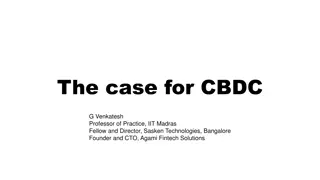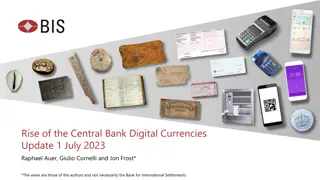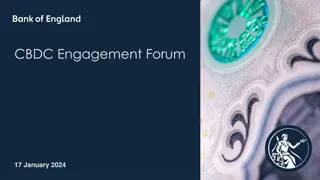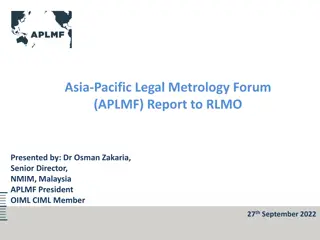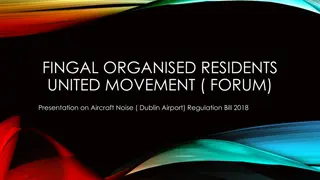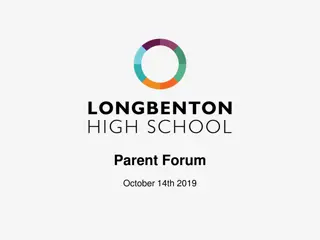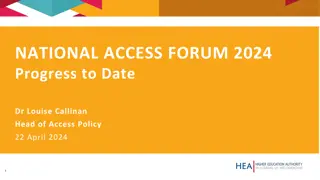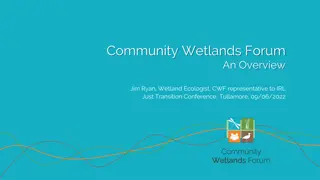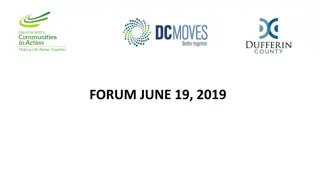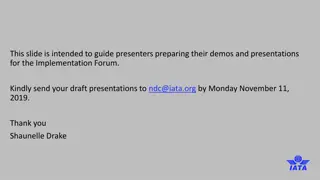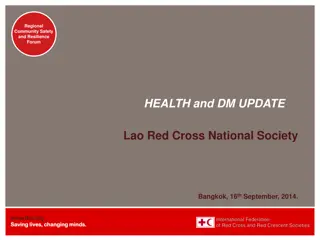CBDC Engagement Forum
This document outlines the details of the CBDC Engagement Forum held on 18th September 2023, focusing on the discussions around Project Rosalind, design objectives, working groups on offline payments and retailer needs, and the current membership involved in the forum. The engagement forum members are actively participating in exploring various aspects related to digital pound design, offline payments, and merchant requirements for digital pound integration, with the aim to enhance innovation in the CBDC ecosystem. The document also highlights the presentation of findings by the working groups to the forum members for further collaboration and progress.
Download Presentation

Please find below an Image/Link to download the presentation.
The content on the website is provided AS IS for your information and personal use only. It may not be sold, licensed, or shared on other websites without obtaining consent from the author. Download presentation by click this link. If you encounter any issues during the download, it is possible that the publisher has removed the file from their server.
E N D
Presentation Transcript
CBDC Engagement Forum 18 September 2023
Agenda Economic Secretary to the Treasury Remarks and Roundtable Discussion Engagement Forum refresh and working groups Project Rosalind CBDC Design Phase Objectives Next Steps and AOB
Item 3: Engagement Forum refresh and working groups
Current Engagement Forum membership Hannah Regan British Retail Consortium Mick McAteer Financial Inclusion Centre Ruth Wandh fer PSR Panel Adam Jackson Innovate Finance Charlotte Hogg Visa Europe Simon Coles PayPoint Andrew Murphy John Lewis Partnership Chris Rhodes Nationwide Building Society Nabil Manji Worldpay Harry Newman Swift Anne Boden Starling Bank Natasha de Ter n Financial Services Consumer Panel Jana Mackintosh UK Finance Simon Gleeson Clifford Chance Colin Bell HSBC Jorn Lambert Mastercard Arvin Abraham Goodwin Procter Simon Gayford Frontier Economics Diana Layfield Google Neha Narula MIT Arunan Tharmarajah Wise Kate Frankish PayUK Tracy McDermott Standard Chartered Bank David Grunwald NatWest Group Paul Bances PayPal Etay Katz Ashurst Martin McTague Federation of Small Businesses Bryan Zhang Cambridge Centre for Alternative Finance William Chalmers Lloyds Banking Group Reema Patel Ipsos UK Fran Boait Positive Money
Working group 1: offline payments Working group 2: retailer needs Considerations for the working group: Consideration for the working group: What are the use cases for offline payments and how would that influence design of the digital pound? What constitutes an offline payment and is it feasible to implement offline payments in CBDC? What would merchants need from a digital pound design? What are the range of factors that would influence whether merchants accept digital pound payments alongside other payment methods? The working groups will present their findings to the Engagement Forum
Item 4: Project Rosalind An API Prototype for retail CBDC ecosystem innovation
We had clear aims for Project Rosalind Innovation platform - using public infrastructure to support private innovation. Harness the creativity of innovators and entrepreneurs - encouraging the private sector to experiment and create use cases. Reusable resource creating a reusable and adaptable technology asset which can be reused for further experimentation, and to generate further innovation. Distinctive project deliberately different to other central bank experiments by focusing on the API layer, and producing a resource that is agnostic to specific payments use cases.
Why we experiment Gain applied understanding of technologies relevant to the design of the digital pound; and assess through practical work their suitability for deployment in a digital pound blueprint. Gather evidence to support the decision on whether or not to build a digital pound, specifically with regard to technology feasibility, suitability, risk and cost. Enrich policy and design work with insights and real world perspectives. Enhance the Bank s capabilities and skills across a range of cutting edge digital currency technologies, that might be suitable in varied deployments (e.g. CBDC, tokenised deposits, real time payments etc). Support capacity building and generate spill-over benefits across the UK digital currency technology community through knowledge sharing and collaboration.
APIs are fundamental to how the digital world works APIs allow applications and systems to communicate with each other. They enable interoperability between different systems and provide access to functionality. They allow developers to develop the use cases that we employ in our everyday lives. Common examples include TfL journey planner.
Project Rosalind is Build API prototypes to explore how an application-agnostic API layer could enable retail payments while support innovation. Support the exploration of the platform model. Public-private collaboration. Public sector to provide basic infrastructure API layer. Private sector service providers to provide user-facing applications.
The project delivered Rosalind APIs Rosalind Sandbox 30+ use cases Project report
The private sector developed a broad range of innovative use cases Payments Conditional Payments Cash on delivery Pocket money Gig economy workers Trade Finance Electronic receipts Micropayments Split payments Integrations PoS QR Smart Cards Offline Payments e-Sim Payments E-commerce One-click checkouts Smart assistants Web-3 NFTs Card schemes Decentralised ID
Whats next? Reusing the APIs for existing and future experiments during the design phase.
Item 5: Digital Pound: Design Phase objectives
Digital Pound Design Phase: where we are now? Phase 3: Build & Test: only if a decision is taken to proceed Phase 2: Design 2023 2025/26 Phase 1: Research and explore 2018-2022 Dependent on decision to proceed Large scale prototypes & live pilots Research and exploration of digital currency questions Development of the model set out in the 2023 Consultation Technical development work and proof of concepts Developing architecture and digital pound platform technical design Decision on whether to proceed Actions After close of consultation on 30 June: Review 50k+ responses Respond formally later this year Iterate further over design phase
Seven aims for the design phase Cut lead-times on development; gain knowledge and capabilities; stand ready to move into a build phase, subject to decision. Determine the technological feasibility and investment needed to build a digital pound. Articulate, in detail, what the technology and operational architecture for a digital pound would look like. Assess and evaluate benefits and costs of the digital pound architecture. Deepen the Bank s knowledge of CBDC technology and private sector understanding of our technology approach. Support the development of the broader UK digital currency technology industry through experimentation and proofs of concept. Provide the basis for a future decision on whether to introduce a digital pound and move to a build phase. By the end of the design phase, we will have: Evaluated the technological feasibility of the digital pound Determined the optimal design and technology architecture Supported business model innovation through knowledge sharing and private-public collaboration.
Design Phase: building our work on four pillars Assessment Build evaluation framework for assessment of proposition Assess feasibility and viability of digital pound proposition Technical Experiments National Conversation Explore different technology solutions and experiments Develop use cases Support industry Open, national conversation about the future of our money Explain and build trust in our work on digital pound Digital Pound Blueprint Determine what the digital pound will look like Set out product proposition Establish build requirements
Role of the Engagement Forum in the Design Phase The design phase will require deeper expert input and problem-solving. The Forum refresh and the launch of working groups reflect this, alongside: Refreshed Technology Forum New Academic Advisory Group The Forum will support work across the design phase: 1) Strategic advice and input on digital pound work and wider industry and society context 2) Forum and working groups to support development of the Blueprint 3) Forum members to shape development of National Conversation as work progresses The Forum will be pivotal in ensuring the design phase is taken forward with input from private sector and civil society.
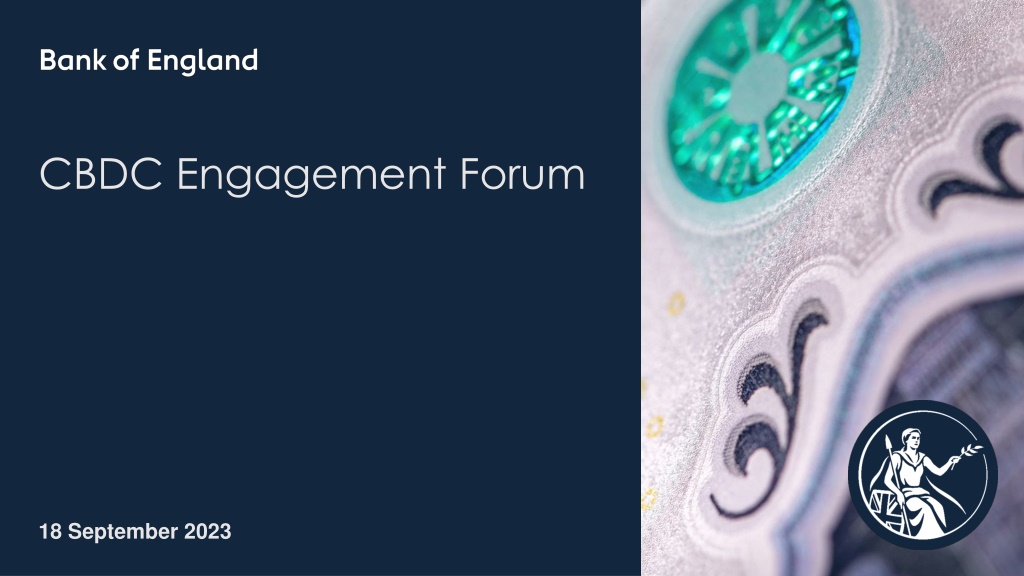
 undefined
undefined









